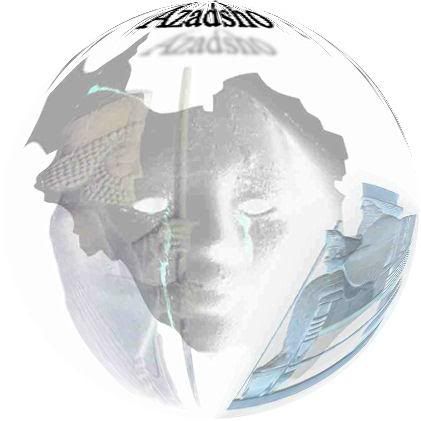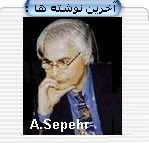آزاد شو

Tuesday, March 21, 2006
Dr M Parvin
US Policy and the Iranian Democracy Movement:
A Third Option
By Mohammad Parvin (03/18/2006)
The blunt statements against Israel recently made by Iranian President Mahmoud Ahmadinejad, as well as his government's blatant resistance to international monitoring of its atomic program, have put the Western states in an awkward situation. They have been forced to take a position in order to save face in front of their own people and the world community. However, it remains to be seen whether the US will redefine its old policy that was tough in words and soft in action. The recent historical background of this policy may be summarized as follows:
Tough positions were taken and harsh statements were made by US authorities, led by President Bush, towards Iran. The harshest comment about Iran was made by the President in his State of the Union Speech on January 31, 2002. He named the regime of Iran, along with Iraq and North Korea, an axis of evil aiming to threaten world stability.
These tough positions and harsh rhetoric were not manifested in any real action. Twenty-seven years of so-called sanctions have existed mostly on paper and have never been fully enforced. Many US companies including Halliburton and GE have dealt with the Islamic Regime of Iran (IRI) during the entire period that sanctions have been in effect.
The Islamic Regime and its lobbyists, such as AIC, the American Iranian Council, that have been lobbying for years for unconditional U.S. relation with the Islamic Regime, manipulated the current US policy by characterizing it as a strategic plan for future military intervention.
The EU states and certain factions within the US government adopted a policy that was advocated by the IRI lobbyists. To take advantage of the public opinion in opposing the military intervention, due to the complications in Iraq, the West has utilized another extreme policy; the policy of appeasement.
This policy acknowledges the terrorist activities and all the wrongdoings of the Islamic Regime while concluding that engagement and friendly relations with the IRI could ultimately control and change its behavior.
The US policy towards Iran has been portrayed as a black and white policy that seeks either military intervention or friendly relations with the Islamic Regime. The Islamic Regime agents, US/Iranian lobbyists, and many among EU states have conveniently exaggerated the military intervention to be able to promote their own policy of appeasement.
In reality, having considered the complexity of the situation and all limitations, the US is currently hoping to avoid military action and the Iranian Regime is using this as leverage to take its recent tough positions in its stance against the US and is envisioning a win-win situation:
The IRI understand the interests of, and has relations with, the EU, parts of the US policy makers and their political machine. They see the very real limitations on US ability to engage in large scale military actions. Therefore, the regime is able to manipulate this situation and obtain the maximum incentives from the West while giving up as little as possible.
In the event of a military strike by the US or Israel, the IRI would consider themselves victims of aggression, attracting the sympathy of the world community and crushing the Iranian opposition harder than ever. By standing against US aggression, they would become the champion of the people in the region, gaining the greater support of terrorist groups, and allowing the Islamic Regime to expand its hegemony in the region.
This win-win situation can be turned into defeat if the Iranian people and their struggle for a secular democracy are not ignored. The west should realize that even if the Islamic Regime complies with all their announced terms and conditions on its atomic program and its relations with Israel and so on, it is still a terrorist regime that has been terrorizing the Iranians for twenty-seven years and it will remain a danger to the entire world.
It is naive and unrealistic to believe that the behavior of the Islamic Regime can be changed through the use of incentives. The idea of exporting the Islamic revolution is a fundamental part of the regime. There is an organization called Ghods' Army created by the regime to pursue this goal. This organization is part of the power structure in Iran. It trains young volunteers for suicide bombings all over the world. There is also a military seminary school in the city of Qom called Mofid School, where ideological brainwashing of vulnerable young Iranians occurs. These young recruits are given a "key" to heaven before committing their attacks.
Obviously, the determining criterion in shaping international policies is political interest. The question is whether there is a policy to satisfy both the interests of the Iranians as well as the Americans. I believe there is. There is a policy that can help bring democracy to Iran as well as peace and security to the US and the entire world. I believe that the US and the international community should explore a third option; one of tough policy against the criminal leaders and non-violent support for a budding democratic movement.
I believe this policy should contain certain elements to show real support for those who struggle for a secular democracy in Iran. This support should not stop at words but be manifested in certain actions including:
Acknowledgement of the fact that a majority of Iranians want a secular democratic regime and are against the entirety of the Islamic Regime, its constitution, and any form of religious rule in the state of Iran.
Imposing smart and targeted sanctions against the Islamic Regime of Iran that would only hurt the Islamic regime and its financial institutions such as “Bonyads” that control more than 60 percent of the Iran economy. These sanctions should not have any loopholes and must be strictly adhered to, unlike the current policy which allowed many American companies such as Halliburton and General Electric to deal with the Islamic regime. The U.S. should encourage other western states to joint the sanction against the Islamic regime and end economic aid to those states that help the Islamic Regime.
Reducing diplomatic relations with the Islamic Regime to the lowest possible level.
Applying the U.S. Anti-Terrorism Act indiscriminately by not allowing IRI lobby groups such as AIC and some US policy makers to legitimize a terrorist regime. All events formed by the Iranian and American lobbyists to promote the Islamic Regime authorities under the disguise of cultural or educational exchange should be stopped.
Providing broadcasting facilities to knowledgeable Iranians who have studied the philosophy and practice of nonviolent actions and civil disobedience so that they can share their knowledge with Iranians inside Iran. This will lead to devising a Realistic strategy that if implemented will empower the people of Iran to change the dictatorship in Iran with minimal outside interference. Removing obstacles for the Iranians who seek justice for the victims of the Islamic Regime through International avenues such as Convention Against Torture.
Forming a Tribunal through the Security Council to try the authorities of the Islamic Regime for crimes committed against humanity.
The terrorist activities of the Islamic Regime cannot be stopped by making promises. It is written into the constitution that fundamentalist Islamic ideology should conquer the world. The severity of this is apparently not understood by the West. The Islamic regime believes that there is a war between militant Islam and the rest of the world. This regime feeds its supporters by using this ideological animosity. By adopting this "god-given" mandate arbitrarily interpreted from the Koran the Islamic regime has become the biggest sponsor of terrorism.
There is no doubt that the nuclear ambitions and activities of the Islamic Regime are a danger to the whole world and must be stopped. However, it is a huge mistake to ignore the terrorist nature of this regime and assume that it can be brought into the world community by bribes and lucrative incentives. The reality of the Islamic Regime, based on its track record, is that the existence of this oppressive government is not only a daily danger to the lives of millions of Iranians; it is a danger to the entire world. This threat must be removed.
The Iranian people can do it. They can change this regime on their own and by doing so, bring peace and freedom to Iran and security to the whole world. Given the opportunity, Iranian activists can learn the theory and practice of civil disobedience and nonviolent action, devise a proper strategy, mobilize the masses and oust the oppressive rulers. No outside interference is required. In fact, such foreign interference would be counterproductive and ineffectual. It can be and should be done only by Iranians. The best way to help the people of Iran is to not legitimize or support the Islamic Regime under any circumstances.
Mohammad Parvin is an adjunct professor at the California State University and founding director of the Mission for Establishment of Human Rights in Iran (MEHR) - http://mehr.org
Archives
May 2004 June 2004 July 2004 August 2004 September 2004 October 2004 November 2004 December 2004 January 2005 February 2005 March 2005 April 2005 May 2005 June 2005 July 2005 August 2005 September 2005 October 2005 November 2005 December 2005 January 2006 February 2006 March 2006 April 2006 May 2006 June 2006 July 2006 August 2006 September 2006 October 2006 November 2006 December 2006 January 2007 February 2007 March 2007 April 2007 May 2007 June 2007 July 2007 August 2007 September 2007 October 2007 November 2007 December 2007 January 2008 February 2008 March 2008 April 2008 May 2008 June 2008 July 2008 August 2008 September 2008 October 2008 November 2008 December 2008 January 2009 February 2009 March 2009 April 2009 May 2009 June 2009 July 2009 August 2009 September 2009 October 2009 November 2009 January 2010 February 2010 March 2010 April 2010 May 2010 June 2010 July 2010 September 2011 February 2012
Not be forgotten
! بختيار که نمرده است

! بختيار که نمرده است

بخشی از نوشته های آقای دکتر امير سپهر ( بنيانگذار و دبيرکل حزب ميهن ) :

آبروی روشنقکران مشرق زمين

رسالت من بعد از نوژه

بی تفاوت نباشيم

نگاه خردمندانه به 28 مرداد
آبروی روشنقکران مشرق زمين

رسالت من بعد از نوژه

بی تفاوت نباشيم

نگاه خردمندانه به 28 مرداد

رسالت من بعد از نوژه

بی تفاوت نباشيم

نگاه خردمندانه به 28 مرداد
رسالت من بعد از نوژه

بی تفاوت نباشيم

نگاه خردمندانه به 28 مرداد

بی تفاوت نباشيم

نگاه خردمندانه به 28 مرداد
بی تفاوت نباشيم

نگاه خردمندانه به 28 مرداد

نگاه خردمندانه به 28 مرداد
نگاه خردمندانه به 28 مرداد
سايه سعيدی سيرجانی :
 مسئوليت، نوشته ای در ارتباط با رفراندوم
مسئوليت، نوشته ای در ارتباط با رفراندوم
پرسش شيما کلباسی از سايه در ارتباط با طرح رفراندوم
هويت، به همراه يک نوشته از فرزانه استاد جانباخته سعيدی سيرجانی با نام مشتی غلوم لعنتی
امان از فريب و صد امان از خود فريبی
روشنگری های شهريار شادان از تشکيلات درونمرزی حزب ميهن :




